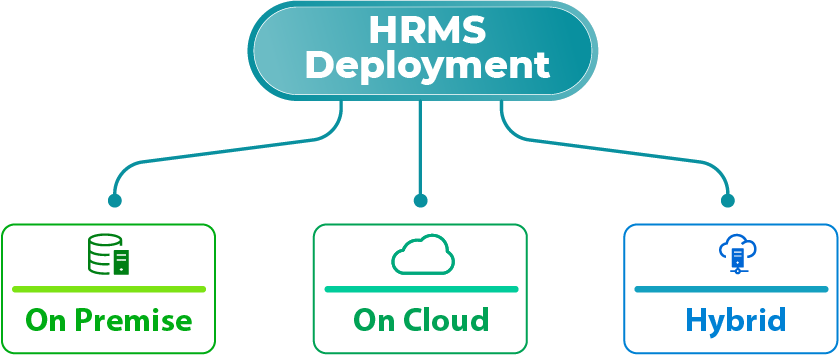On Premise, On Cloud or Hybrid Hosting? Don’t let the words scare you! Learn about these 3 HRMS Deployment Options and know they can make your company’s workflow efficient!

There are three ways an HRM System can be deployed- On Premise, On Cloud and Hybrid.
Spine HR Suite offers you all three options of deployment. Very few providers in the market provide all three deployment options while Spine offers you all three and on top of that, the best client support!
On-Premise HRMS Deployment
On Premise is when you have the software and the system on your company premises. The initial cost here is higher but so is the level of confidentiality. For managing and maintaining such a system your organisation must have an IT Team.
Advantages:
- Long-Term Cost
The upfront cost of implementing an On-Premise HRMS System might be large but if we look at the full cost of ownership and longevity, the cost is comparatively lower than the recurring payments.
- Control
With On-Premise HRMS, you have complete control of your system and the server, given that you have a dedicated IT Team. Since the hardware and data belongs to you, any changes or configurations can be done at your convenience.
- Security
With HRMS hosted on premise, only you have access to your data. No one outside your network can access your organisation’s data. One can certainly say that on-premise hosting is the most secure way of storing and hosting an HRM System.
Disadvantages:
- Upfront Cost
The upfront cost of hosting HRMS on premise is large. A smaller organisation might not be able to afford to bear the upfront cost of hosting an HR Management System on their own premises.
- Maintenance
The cost for maintenance of an on premise HRM System is higher as compared to a cloud hosted HRMS as well. Also the organisation must bear the cost of a dedicated IT Team as well.
- Deployment
The deployment process of an on premise HR System is lengthy and time consuming as well. On Premise HRMS deployment is suitable for bigger organisations who must maintain a high level of confidentiality and must have secure connections.
On-Cloud HRMS Deployment
Next up is SaaS, the software will be installed on our system or cloud. The initial cost is comparatively lower in the short term. A Cloud Based HRMS is maintained and managed through a remote server, usually the solution provider’s own server. To access this server you will have to login with the provided credentials i.e. your Login ID and Password.
Advantages:
- Accessibility
With your Login ID and Password, you can access cloud hosted HRMS from anywhere at any time. On-Cloud HR Systems can be accessed through Android, iOS and Web provided that the solution provider is present on these platforms.
- Affordability
Cloud based HRM systems are cheaper as compared to an on-premise HRMS in the short term as there is no upfront cost. Payments should be made in periodic intervals though. These periodic payments include the maintenance costs, support costs and licensing as well.
- Easy Maintenance
Maintenance is very easy with cloud hosted HRMS, since it is externally hosted, there is no need for you to worry about or invest time in the maintenance of your software.
- Deployment
A cloud hosted HRMS is easier to deploy as it is accessible through the internet. It can be set up in less time as there is no need to install a physical server.
Disadvantages:
- Connectivity
With HRMS deployed on cloud, there is a necessity of a reliable internet connection as the server is accessed through the internet.
- Customisation
Since the system is not present on the premises of your organisation, customisation and/or configuration of the system is a difficult process. Also sometimes, complex configurations may not align with a cloud server.
On-Cloud HRMS is suitable for smaller organisations who don’t have multiple softwares and must not maintain a level of confidentiality as high as some other companies
.

Hybrid Hosting
And Finally, Hybrid. As the name suggests, it is a hybrid of both of the above mentioned options. It gives you the confidentiality by installing the software on your premises while keeping the costs down. This kind of hosting offers you a hybrid of the above mentioned options. The Cost is high but it also has a higher level of customizability. It is suitable for organisations which have multiple softwares but do not want to or cannot get an on premise server.
Advantages:
- Cost
As compared to On Premise hosting, Hybrid more offers you a lower initial upfront cost. Instead the upfront cost is usually distributed over the course of a year.
- Customisation
Since the system as well as the software is on your premises, you have a greater level of customisability. Along with that, updates and maintenance is easier as well because of the constant support of the provider.
- Accessibility
Just like an On Cloud System, you can access Hybrid HRMS at your convenience. But Hybrid does not limit the accessibility to just the software, since the system is also on your premises, you can access the system and server just as easily.
Disadvantages:
- Long-Term Cost
When we look at the long-term cost of an Hybrid system, it turns out to be more than the one time initial investment you make with On Premise HRM System since the payments are spread over a period of time, the costs add up to a great amount.
- Server & Maintenance
Since the server is on your premises, you need to have a dedicated IT Team and bear server maintenance costs. Just like an On Premise system, the server maintenance costs are higher here.
To conclude, all the deployment options have their own pros and cons. You should choose the option which best suits your organisation’s needs. If you are considering getting an HRM solution for your organisation, Spine HR Suite is one solution provider which offers all three options of deployment.
